1 Brick Court, Temple, London. E.C.4. Dated 26 June 1919 - Thanked [Peter] Mackie for giving another £1000 to the [Roscoe] expedition; met the editor of the African Society's Journal, [William] Crabtree, who is writing an article on the expedition; hears [Henry] Jackson is very ill of diabetes; is working on a translation of Apollodorus for the Loeb Library, grudges the time spent on it, wants to return to anthropology, 'my real work'.
1 Brick Court, Temple, London. E.C.4. Dated 24 July 1919 - [William] Crabtree wrote a notice in the July number of the Journal of the African Society; writes about the illness of Lilly Frazer (a bad cold), [William] Ridgeway (recovering), Henry Jackson (diabetes), and Dr Black (whooping cough); the Peace Day celebrations were unremarkable and the miners are behaving badly.
1 Brick Court, Temple, London. E.C.4. Dated 12 September 1919 - Tells him he has asked the Royal Society to sort out his customs problems, recommends he write direct to the Royal Society in future; hopes he is in the field and has employed a competent photographer; Alexander Macalister has died; Henry Jackson is better.
Hotel Lutetia, Paris. Dated 5 Jan. 1920 - Made a short report out of his letters about the Bahima which was published in 'The Times'; encloses a letter from Sir Herbert Read to Hardy about travel arrangements [not transcribed]; describes Lilly Frazer's illness; Sir John Sandys has resigned the Public Oratorship, W. J. Lewis broke his leg badly in Switzerland.
1 Brick Court, Temple, London. E.C.4. Dated April 8th 1920 - At a meeting of the Committee of the Expedition [William] Mackie offered another £1000 for the fund, which had been invested in War Loans which had lost value; is planning on writing a fuller report on the expedition for 'Man'; have moved back into the Middle Temple flat, Lilly still has a racking cough; spent a day in Cambridge and saw various friends (W. J. Lewis, J. W. Capstick, and J. J. Thomson, but not Henry Jackson), and has been offered an honorary degree; has had a friendly letter from [William] Ridgeway; has a copy of 'Totemism and Taboo' by 'a German or Austrian psychologist [Sigmund Freud], who borrows most of his facts from me', 'he seems to have a great vogue with some people'.
1 Brick Court, Temple, London. E.C.4. Dated 23 July 1920 - Has had some MSS and instructs him to indicate how many packets he is sending, etc.; asks what his plans are; have had workmen in the house; [W. H. D.] Rouse's school [The Perse] has bought 20 acres of land on Hills Road [in Cambridge].
Hotel Lutetia, Paris. Dated 23-24 November 1920 - On the 23rd, he writes he has heard that a long account of the expedition was published in 'The Daily Mail' and is sorry to hear that such a 'low and vulgar paper' should have the first report of a scientific expedition, 'even Sir Peter Mackie is probably not a good judge as to the proper mode of publishing the results'. On the 24th he says he has written [Sir Peter Mackie] that a full report should be deferred until after the dinner; Lilly has written their friend [Wickham Steed] of 'The Times' about it.
Ovington Rectory, Thetford. Dated 25 November 1920 - Writes his side of the story concerning the article in the 'Daily Mail', condoned by Sir Peter Mackie so that he felt he had no choice; does not believe Mackie is giving him a dinner, and no one at the Royal Society has mentioned a speech; finds the muddle most distasteful and is sorry Frazer is away.
Hotel Lutetia, Paris. Dated 10th December 1920 - Recommends he follow Sir Peter Mackie's idea of giving lectures, and write a popular account of his travels, thinks he should accept the Cambridge University Press offer.
1 Brick Court, Temple, London, E.C.4. Dated 31 January 1921 - The Royal Society will ask him to give a report on his expedition; Abbé Breuil will give an illustrated lecture on prehistoric caves; is pleased to hear the King has asked the Colonial Secretary Winston Churchill to consult him; asks for a list of those he wishes invited to hear the lecture, suggests Churchill and Sir Herbert Read.
1 Brick Court, Temple, London, E.C.4. Dated 8th March 1921 - Advises him to diregard 'rubbish' printed in the press; has seen Mr Driburgh [recte Driberg?] and gave him an introduction to [George] Macmillan; the photos in the 'Illustrated London News' are very striking.
1 Brick Court, Temple, London, E.C.4. Dated 23 June 1922 - Saw [William] Hardy who says he has asked Sir Peter Mackie for permission to use the expedition fund for publishing the reports; discusses a meeting he had with [Alfred?] Waller of the [Cambridge University] Press, thinks there might be better terms from Oxford University Press, with help from [R. R.] Marett; is happy with the room Trinity has given him for his library; asks if he has J. H. Hutton's book, 'The Sema Nagas', which seems first-rate.
Hotel Lutetia, Paris. Dated 22 February 1923 - Thanks him for the proofs of the second volume; he and Lilly have not been entirely well; hopes to speak at the Renan centenary on the 28th; shall miss [Herbert Vaughan] Cox very much; saddened by the death of John Sutherland Black.
Hotel Belle Vue, Monnetier-Mornex, Haute-Savoie, France. Dated 23 July 1923 - Thinks there should be a map in his third volume; and the dates and route of the expedition should be detailed in a preface.
Lanfine, Hills Road, Cambridge. Dated 1 March 1924 - Received his last volume, 'The Bagesu' and congratulates him; asks if he has seen [Robert] Rattray's book 'Ashanti'; is almost done with his lectures at Cambridge; saw A. B. Cook and his wife, the second volume of his 'Zeus' will not be out for some time.
Lanfine, Hills Road, Cambridge. Dated 7 March 1924 - Is sorry the expense of publishing his [Frazer] lecture is his, hopes to remedy this in future; has not heard from [William] Ridgeway; saw Bishop [Thomas Wortley] Drury at St. Catharine's; is sorry there are no congenial men in his neighbourhood; sees parallels between the use of children in ritual in 'The Banyankole' and ancient Greek ritual; asks if he has seen P. A. Talbot's 'Life in Southern Nigeria' and E. S. Hartland's 'Primitive Paternity'; gave his last lecture and is glad they are over.
Trinity College, Cambridge. Dated 25th July 1924 - Thanks him for his [published Frazer] lecture ['Immigrants and their Influence in the Lake Region of Central Africa']; Edward Clodd suggested seeing if the Geographical Expedition would fund a second expedition, and saw [Arthur] Hinks, who also mentioned the Boundary Commission going to Lake Rudolph and Abyssinia; mentions that Lilly has eagerly taken up the idea for another expedition and should not be surprised if she succeeds in organizing and financing it 'as well as she did the first; for we owe the Mackie fund entirely to her'; they have sold Lanfine.
Transcript
Grand Hôtel des Bergues, Genève
3. Jan 1898.
Dear Mrs. Eddington,
I sent you just one bit of my ideas abt. Stanley as soon as he left us. The rest must follow now.
His presence has been a great pleasure to us. You have got a boy mixed of most kindly elements, as perhaps Shakspeare might say {1}. His rapidly and clearly working mind has not in the least spoiled his character. I don’t know when I have had to do with so modest and gentlemanly a boy. It is a testimony to day schools and home training, (not, I am afraid, my favourite theory.)
His youth has, of course, been just a little against his making friends, but has not been fatal to it. In Clayton, & in Wood & Brown he has nice associates; but he seems more contented alone than most boys are.
His work is all that I expected, & more: & I feel altogether that he is “a precious youth” committed to my charge. I can realise to some extent what Margaret would feel like if she were left alone to bring up our own little Richard.
I remain
Your friend sincerely
John W. Graham
—————
The writing-paper is engraved with illustrations of the hotel, etc. The year is wrong, as Eddington did not enter Owen’s College till October 1898 (see his Notebook).
{1} Graham evidently had in mind Antony’s encomium on Brutus at the end of Julius Caesar: ‘His life was gentle, and the elements | So mix’d in him that Nature might stand up | And say to all the world “This was a man!”’
Transcript
(copy)
Royal Observatory, Greenwich, London, S.E.
1909 Nov. 15
Dear Dr. Schuster
You will, I am sure, not be surprised that I have delayed a little replying to your important letter. I had not at all thought of such a change, and it was a matter requiring very careful consideration. Whilst the idea of returning to Physics, and perhaps especially to academic work, was in many respects attractive, I have however decided that it is best for me not to leave my present work. I need not trouble you with the reasons that have led me to this difficult decision; rightly or wrongly I have concluded that the suggestion and opportunities that I meet with in a large observatory are more likely to lead to good research work on my part {1} than any I could hope for elsewhere.
With many thanks
yours sincerely
A. S. Eddington
—————
The letter is headed ‘copy’ but, since it contains a correction, it is probably a draft.
{1} ‘the suggestion …. on my part’ has been altered from ‘the suggestion and opportunities of research work that I meet with in a large observatory are more likely to lead to good results on my part’.
Transcript
1912 Sept 11
R.M.S.P. Arlanza {1}
My very dear Mother
We are getting near Pernambuco now. The time at sea has passed very rapidly and pleasantly and I shall be very sorry when the voyage is over. The slightly overcast skies which we had about Madeira have given place to continual bright sunshine, but there has been a strong refreshing breeze always. Most of the regular travellers on this route say they have never known it so fresh and cool all the way. The only time I find it really hot is when I come down from the deck at night to the cabin; then for an hour or so it seems very close and I usually read for an hour to get cool again before going to sleep. The dining saloon, decks, & smoking rooms are beautifully cool. Of course I am wearing the thinnest things possible.
We did not land at St Vincent but were surrounded by boats (as at Madeira)[.] These were all occupied by negroes; the little nigger boys were very amusing[;] I tried to photograph them. I saw a shark whilst we were at anchor. We see lots of flying fish, regular shoals of them, skimming from wave to wave. Most of them are very small[,] almost like butterflies. They look very pretty in the sunlight.
I have got to know some of the southern stars now but they are poor compared with the northern ones. The Southern Cross is not visible yet[;] it is the wrong time of the year for it. The Chief Officer took me up on to “Monkey Island” above the Bridge where one gets a good clear view of the sky.
One day is much like another and I hardly keep account of time. We have had Sports, Games, Fancy Dress ball, etc. I went in for several of the Competitions—including spar-boxing (with the pillow), life-belt race, Are you there?, deck quoits, threading the needle (with Lady Grant holding the needle), but did not have much success, except at chess. I got to the Final Round at Chess, and had to play quite a young opponent for the final. We drew one game and he won the replay. They had a specially good dinner to celebrate the 90th Anniversary of the Independence of Brazil, and some speeches (chiefly in Portuguese)[,] also a dance which did not interest me.
Of course I know a good many people by now. One man that we see a great deal of is Major Caroll (an Irishman)[;] he is a very nice fellow. The Captain comes down to dinner generally; although he is said to be the most popular man in the service I dont care much for him. He seems generally grumbly—a pig-headed old man I think; though I have no doubt as a Captain he is very good indeed. Lady Grant also is a tiresome old lady, with an enormous appetite. The Unwins are quite nice people.
We pass a great number of ships chiefly tramp steamers. The Avon passed us quite close a few days ago and I saw it. We had one little excitement yesterday as a tramp steamer required a Doctor (a man having got an iron splinter in his eye) so we stopped whilst he was brought on board and attended to.
We crossed the Equator about 3 o’clock yesterday afternoon but there were no traditional observances; everyone (at the time[)] was excited about a tug-of-war Married v Single. Atkinson pulled in it as well as Davidson & I. The “married” were ever so much heavier than we were, and pulled us over easily.
It is curious having no letters or English news of any sort. We have not even had the daily Marconigram since leaving Lisbon—have heard nothing whatever. I hope you are getting on well.
We expected to be in the Doldrums the last three days—a region of calm close air with rain—but instead of that we have had delightful fresh weather[;] it is most unusual just here.
With very dear love from
your affectionate son
Stanley
I hope Winnie is having a got {2} time at Lynton[.]
—————
Letter-head of the Royal Mail Steam Packet Company. Numbered ‘3’ at the head in pencil.
{1} ‘R.M.S.P.’ is printed.
{2} A slip for ‘good’.
Transcript
1912 Sept 15
R.M.S.P. Arlanza {1}
My very dear Mother
It is now the last day on the steamer, and we are to reach Rio at about 7 o’clock tonight; I do not think we shall land until tomorrow morning.
We did not go on shore either at Pernambuco or Bahia as they are neither of them very healthy places. At Pernambuco there is no real harbour and we anchor someway out at at† sea but Bahia is a magnificent bay. The land is very low all the way between them; and the coast (which we keep in sight) is monotonous, only there is a curious white sand all the way along which makes it look like chalk cliffs.
The most interesting thing is seeing the whales, which are quite numerous. You see them spouting frequently and sometimes catch a glimpse of the whale itself. We left Bahia on Friday, and yesterday (Saturday) the rain came down in torrents; it was the first time we had had anything more than the slightest showers. In the evening the rain stopped, and the wind got up, and we really pitched quite a lot it was quite pleasant for a change. Today is a perfect day again, clear, and with brilliant sunshine. It is quite cool again and I am wearing my usual English clothes.
I know all the Officers now pretty well; the Chief Officer is a very nice man and a great favourite with the passengers.
I had a letter from Rio at Pernambuco which was very satisfactory; Lee {2} has visited all possible sites. I rather think we shall go to Alfenas further inland than Christina but do not know yet. The Brazilian government is going to do us well. I have met several passengers who know the country well. They say we are sure to have fine weather, and the country is a regular health resort, where the inhabitants all live to be centenarians.
Some of the passengers bought little marmoset monkeys at Bahia; they are sweet little things that you could put in your pocket but I was not tempted to go in for one.
I will not add more as there is a fine bit of coast outside that I want to see and then I must get my packing done.
With very dear love from
your affectionate son
Stanley
—————
Letter-head of the Royal Mail Steam Packet Company. Numbered ‘4’ at the head in pencil.
{1} ‘R.M.S.P.’ is printed.
{2} ‘the Interpreter’ has been interlined above a caret, in an unidentified hand. The person referred to is T. N. Lee, an Englishman deputed by the Brazilian Government to as-sist the expedition. See The Observatory, xxxv (1912), 410.
† Sic.
Transcript
Passa Quatro | Minas Geraes
1912 Sept 26
My very dear Mother
I was very glad to have your letter of Sept 5, which reached me here yesterday afternoon. It was a long time to be without news of you. We spent Friday & Saturday last week pretty quietly in Rio; our baggage (instruments) at last departed on Friday midnight. We left at 9∙30 p.m. on the São Paulo express for Cruxeiro with Lee and Worthington; it was a very comfortable train and we reached Cruxeiro at 2∙30 a.m. Our plan was to sleep in the waiting room and superintend the transfer of the instruments to the narrow-guage† line as soon as it was light; but on arrival we found the instruments had only got a little way and would not reach Cruxeiro until the next day. The waiting room was rather crowded, so I slept very comfortably on my trunk on the platform. We caused much amusement to the porters.
We breakfasted off black coffee, bread and bananas; and Davidson & I had a good walk. It was rather cold cloudy weather, but the country was very wild & beautiful. We left Cruxeiro by a goods train (on to which however they put a saloon car for our benefit). It took nearly 3 hours to do the 20 miles to Passa Quatro, but there was a steep climb all the way. We wound up a very remarkably engineered track and it was a most enjoyable journey with splendid mountains all round.
At Passa Quatro we have a clean and comfortable inn kept by M. Rénier who is in charge of the government meteorological station here. He and his family take meals with us. The other occupants of the inn are de Souza and his wife who is (until Morize arrives) in charge of the Brazilian party’s arrangements; and Stephanik†, and his assistant, who form an official French expedition sent by the Bureau des Longitudes. They are all very nice people; but we very much dislike Lee and Worthington (especially the latter) and it is hard work to avoid a regular rumpus.
Our eclipse camps are about a mile away at a Fazenda near the railway. This site seems a very good one though it is rather surrounded by hills. Since the first day we have had splendid weather—clear blue skies with hot sun but cold in the shade and freezing at night. There are no mosquitoes snakes bugs or cockroaches so far. The Brazilian butterflies are very fine; but they are not very numerous as it is too early for them. I have seen some very large ones.
We have a special engine on which we go to and fro to the Fazenda. It takes us down at 8 am, brings us back to déjeuner at 11; takes us down again at 1 and brings us back at 6. The meals are quite good but rather French in style—all sorts of little meat courses. We have various weird vegetables and concoctions—no black beans as yet. One speciality here is fruit-cheeses, which we have at lunch every day.
We started the building of the piers for the instruments on Monday and they were ready for use today. Our baggage turned up on Monday night and was dumped by the side of the railway opposite the Fazenda. It took us practically all Tuesday afternoon to convey it (in bullock carts drawn by 6 oxen) to the actual field of operations; and it was pretty heavy work loading the carts and unloading them.
These last two days we have been hard at it, erecting huts and getting out a few instruments. I daresay it will be a week before we can slacken off our efforts. We have one boy engaged to assist us but he is not very much use.
The Argentine & Chilean expeditions were going to Christina about 50 miles further on. The former (Perrine & his 3 assistants) came to dinner with us at our hotel in Rio on the Thursday evening and we had a very jolly time I hope to have time to visit their camp at Christina before the eclipse.
I find my helmet very useful but have not worn my drill suit. It is really wonderfully cool weather and one could hardly imagine we are in the tropics. The country here is lovely.
With very dear love to both
ever your affectionate son
Stanley
I hope Winnie had a good trip.
—————
Numbered ‘6’ at the head in pencil.
† Sic.
Transcript
Funchal
1919 March 27
My very dear Mother
We have been here nearly a fortnight, and though we are anxious to be getting on to Principe, it is very delightful being here and I am not at all tired of Madeira. We have had a variety of weather; but there is always a good deal of hot sunshine every day. At first we had three days of “leste”, a hot dry east wind coming from the Sahara; it blows in gusts—dead calm for a long time then quite suddenly a furious wind for about 10 minutes. It did a good deal of damage to the trees and to the tiles on the roof here. Afterwards we had brilliant weather all day, but not quite so hot. This last week we have had a good deal of rain—chiefly at night but some sharp showers in the day as well—with snow on the tops of the mountains. Now it is comparatively cold; but that is only relatively speaking; because I am still wearing my thinnest shirts & vests and can sit out of doors even at night.
I have been two good long walks on the mountains. The funicular railway is not running regularly but there are occasionally excursions. We went up one day starting at 12 o’clock and reached the top—Terreira de Lucta—(2800 feet) about one o’clock. Cottingham and I took some sandwiches, and walked on at first by road and then on the hillside, making for a special view-point in the centre of the island. He found it too hard work, so I left him for 1½ hours and finished the climb alone. The view-point, Ariero Observatory, is 4800 feet above sea-level, and is a balcony overlooking a magnificent gorge at least 2000 feet deep which winds down to the sea on the other side (north) of the island. After seeing this, I rejoined Cottingham and we walked back to Terreira de Lucta which we reached about 5 o’clock, and then came down into Funchal in a toboggan a run of about 4 miles.
The second expedition was to the Grand Curral a point further round to the west. Cottingham and I started at 9 o’clock, and we got back about 5∙30. The walk was nearly twenty miles; but the weather was cooler so it was easier. Most of the way was along paved roads often very steep. We got many fine views on the way; and in places the gorse was out, and looked very pretty. The Grand Curral (=great cattle-fold) is a small plain almost entirely surrounded by a ring of mountains—like the crater of a volcano. We looked down on it from a saddle 3300 feet above sea-level and more than 2000 feet above the Curral. On all other sides the mountains were much higher. It is extraordinary, how much of the land is cultivated, all the steep sides of the mountains are terraced into tiny fields up to a great altitude. There is an elaborate system of irrigation; the artificial water-courses (called “levadas”) tap all the rivers near their sources, taking away nearly all the water and leaving only stoney† beds.
The main place of resort in Funchal is the Casino. We often go there in the afternoon for tea. The tea (the beverage) is much better than at the hotel; it has been very scarce in Madeira. There is a roulette table which is well-patronised and it is interesting to watch the players.
The beach is very poor, very steep and stony; and is unattractive, because it is used as the general rubbish-heap. But it is interesting to sit on the pier especially when any of the large steamers are in. There has been no mail from England since I came; but we are expecting one today—the Chepstow Castle—. I did not know I should be here so long or I would have asked you to write here.
There are lots of bananas here and I usually get through about a dozen a day. There is not much other fruit. Prices are generally a bit lower than in England but there is not much difference. The meat here—mutton, veal, beef—is extraordinarily good the best I have ever tasted I think. We can get good cigarettes at 10 a penny; but I chiefly smoke a mixture of native tobacco at a penny an ounce with imported tobacco at a shilling an ounce—the native stuff is too dry to use by itself.
We made friends with a gentleman from the telegraph (cable) station, and he got us permission to see round it yesterday. It was very interesting. They have a lot of new improvements since I was at the station in Malta.
There was a British warship here one day, and they had a football match against the Cable station, which we went to see. The weather was more suitable for watching than for playing. They must have found it terribly hard.
We know a number of people in the hotel. Ritson a commercial traveller from Manchester, Ash a queer old gentleman, Mrs. Caswell a merry widow and her daughter, Mr and Mrs Thomas from Swansea and others. Most of them intend to go on to the Canaries next Sunday. The landlord & landlady Mr. & Mrs. Jones are extremely pleasant & good-natured people.
Three ships were torpedoed by submarine in Madeira harbour during the war, and one sees the masts of two of them sticking up out of the water. The town was also bombarded and there are a few traces visible.
I hope all is going well at Cambridge. I shall be glad to hear news of you when I reach Principe.
With very dear love from
your affectionate son
Stanley
—————
Numbered ‘3rd’ at the head. Four passages have been marked off and emended in pencil by a later hand.
† Sic.
Dorchester Gaol. Forwards a copy of 'The Philanthropist', revolution in Naples, Hone's 'Apocryphal New Testament', complains that the gaolers will not let him communicate with Wedderburn, thinks the gaolkeeper and the magistrates "an infernal set":
Office of the Minister of Defence.—Is glad that Pethick-Lawrence was able to attend yesterday’s Indian independence celebrations.
House of Lords.—Is sorry to hear of the death of Lady Pethick-Lawrence.
Well House Farm, West Mersea, Essex.—Asks for a reference for his grand-daughter, who is applying for admission to New Hall, Cambridge.
George Allen & Unwin Ltd, Ruskin House, 40 Museum Street, London, W.C.1.—Invites him to contribute to a book on ‘the Conscription of Wealth or a levy on Capital’.
4 Oak Hill Park, Hampstead, N.W.3.—Congratulates him on his elevation to the House of Lords.
(Undated. Postmarked 4 Aug. 1945.)
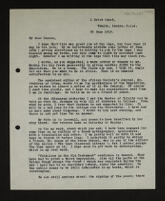
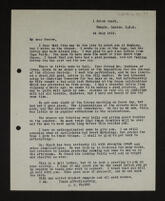
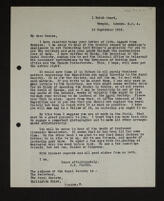
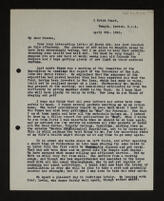
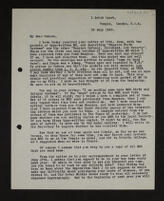
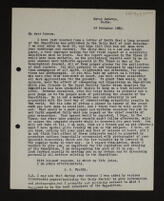
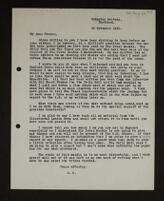
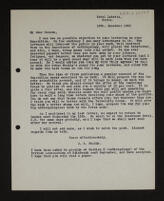
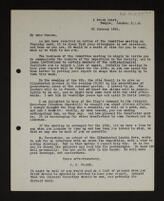
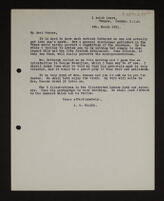
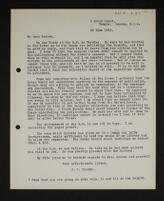
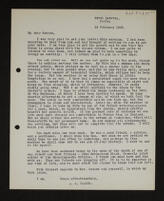
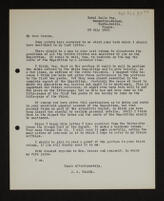
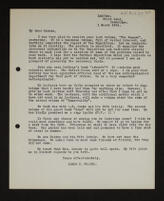
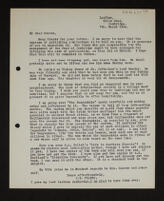
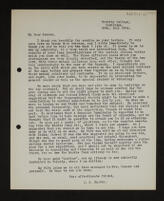







![Letter from Richard Carlile to [John] Webb](/uploads/r/trinity-college-library/9/d/e/9de8542aa41c71c173eae4df14be95ef83f211d94098427fd9c1358df8a3e38e/004.SRMS.B23.2.front.tmb.jpg)




